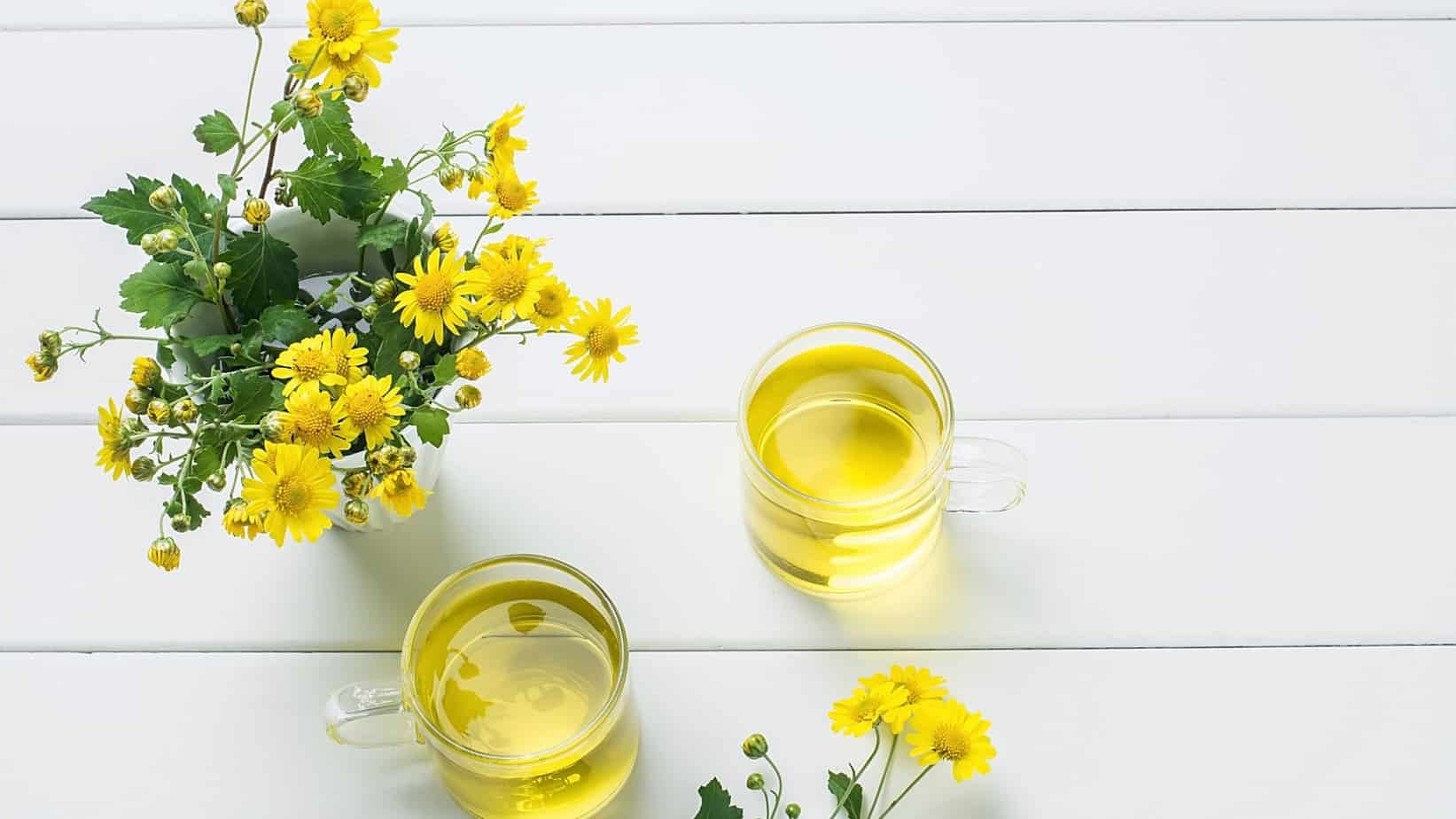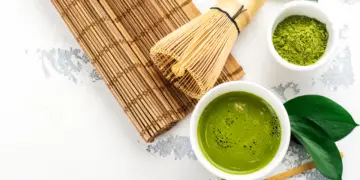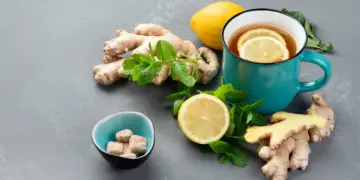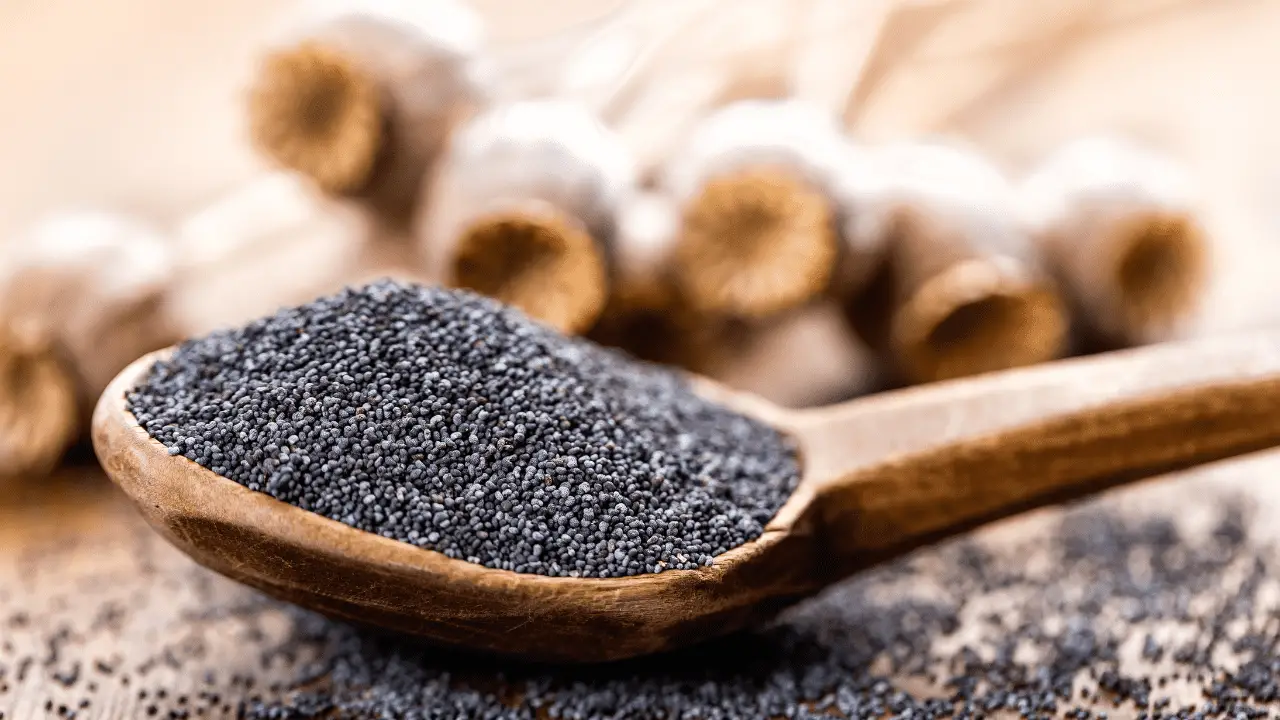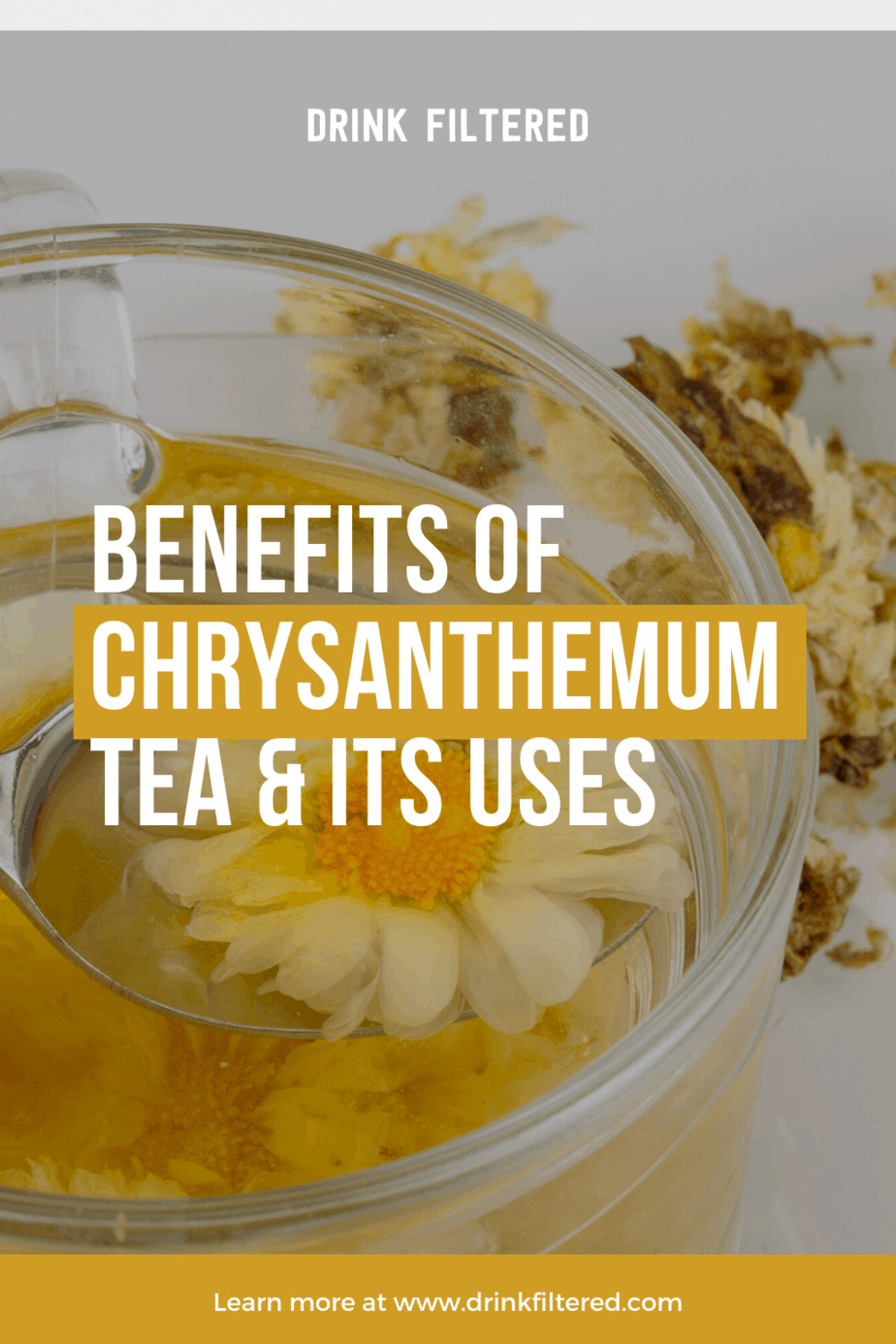Oh the Chrysanthemum!
An edible flower belonging to the sunflower family, originating from China is now receiving it much deserved attention in the spotlight.
As western medicine catches up, expect more research that uncovers its many health benefits.
In the meantime, here is what we know about this delicate little flower and the effects of steeping it in water…
Chrysanthemum, A Good Source of Antioxidants
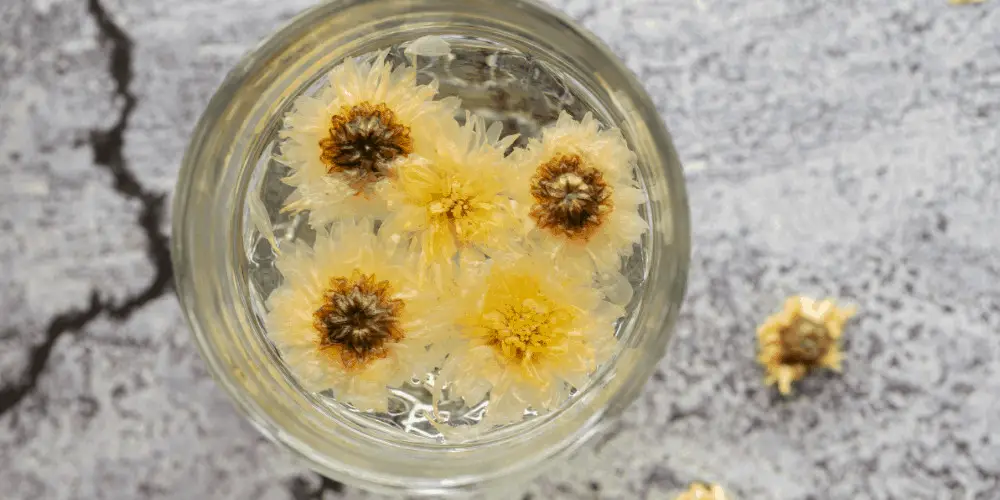
A strongly backed benefit of Chrysanthemum tea is that it is a great source of antioxidants. It is packed with many flavonoids, phenolic acids, and lignans, all shown to be protective against oxidative stress caused by free-radicals in animal subjects.
It is also shown to have an anti-inflammatory effect and anti-cancerous activity against certain cancers. This is not to say it will cure cancer… It will not.
Chrysanthemum, Nutrients Rich
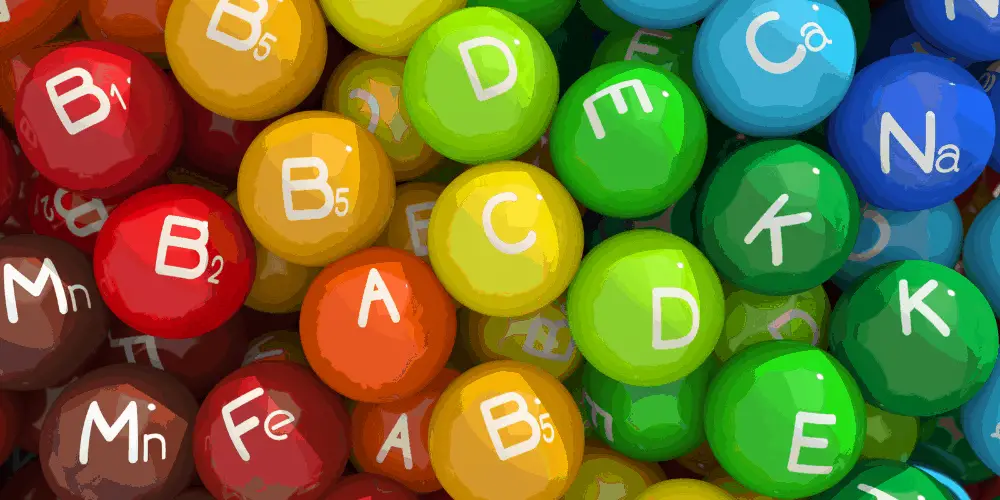
Chrysanthemum tea is rich in certain nutrients, like vitamins A, B, C, and the mineral, manganese.
Vitamins and minerals are essential for the maintenance of many functions in our body. Take for example:
- Vitamin A is essential for good vision
- Vitamin B complex performs a number of functions including maintenance of our nervous system.
- Vitamin C is essential for functions like the formation of collagen, which keeps skin younger-looking and maintains joint health..
- Manganese is important for bone formation and immune response.
The Vitamin C and E from chrysanthemum is thought to reduce embryo toxicity preventing congenital malformations (neural tube defects caused by sodium valproate). This makes drinking drinks high in these vitamins, healthy drinks to consume during pregnancy. In fact, these have 2 vitamins have been shown to reduce oxidative damage during pregnancy.
Chrysanthemum, NeuroProtective

Chrysanthemum is rich in antioxidants. A specific flavonoid component of Chrysanthemum called myricetin is known to exhibit many important benefits, including being neuro-protective. Studies have shown that myricetin has a protective action against Alzheimer’s and Parkinson’s disease. It protects against the free-radicals that when left unchecked can cause damage to the brain.
Myricetin is also active against a specific brain tumor called medulloblastoma, and appears to be effective for migraines as well. Research has shown it does this by increasing the levels of serotonin in the brain; a mechanism that some migraine-medications (sumatriptan) induce.
Myricetin has also shown some anti-aging action. All great things to keep your brain healthy.
Chrysanthemum, Arthritic Protection

Arthritis is a common painful joint condition that affects quite a number of people around the world.
A 2017 study showed that the anti-inflammatory effect of Chrysanthemum delayed onset of arthritis and reduced clinical severity of the disease, and therefore might be helpful for conditions like rheumatoid arthritis.
Chrysanthemum also has analgesic properties so adding a few cups of this tea each day may help with arthritis pain.
Chrysanthemum, Anti-Diabetic Action

In essence, diabetes occurs with either one following scenario: insulin is not produced adequately, or the body stops responding to insulin produced(insulin resistance).
In both cases, the body fails to utilize glucose, leading to an increase in blood glucose level.
Studies suggest that Chrysanthemum reduces blood sugar level, as well as improves glucose tolerance and insulin tolerance; the primary defect in type 2 diabetes.
Additionally, research in mice suggests that it might provide protection against diabetic retinopathy; a common long-term complication of uncontrolled diabetes.
Side-Effects of Chrysanthemum Tea
All in all, chrysanthemum tea is quite safe to use on a regular basis, especially in moderation.
Although, there is limited research regarding the side-effects of Chrysanthemum tea, some of the potential side-effects to consider are:
- Allergic reaction: if you have a known allergy, avoid consumption. Studies suggest that people who have ragweed allergy may also react to Chrysanthemum flowers.
- Trouble Sleeping: excessive tea drinking can cause side-effects like insomnia, restlessness, and anxiety. Keep a maximum intake of 3-4 cups per day to avoid the side-effects.
- Anticoagulant effects: Myricetin has anti-platelet action (i.e. prevents coagulation). This might be beneficial for those with thrombotic diseases, though anyone taking anti-platelet medication should avoid drinking too much of Chrysanthemum tea to avoid a possible risk of bleeding.
- Low Blood Glucose: be cautious of your blood glucose level if you are on insulin or oral hypoglycemic drugs. Decrease or discontinue consumption of Chrysanthemum tea if too low.
How to Prepare Chrysanthemum Tea
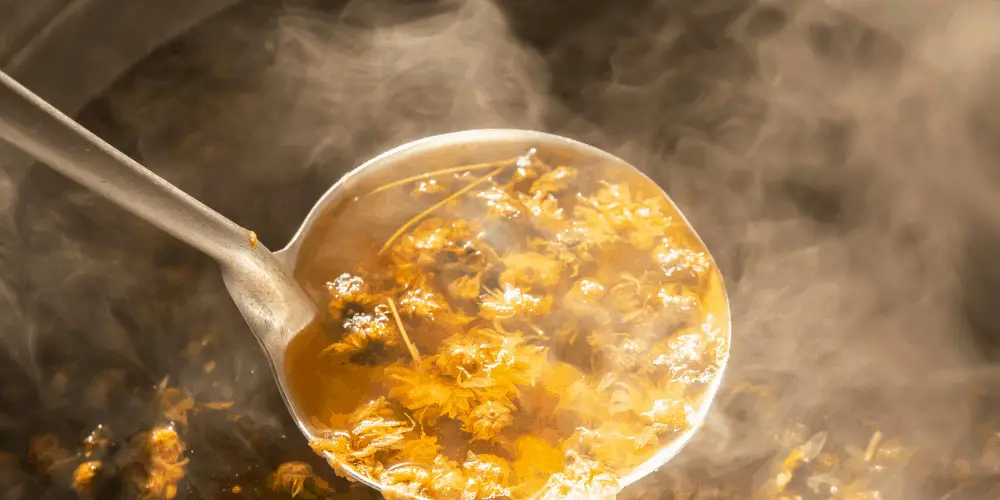
You can purchase premade Chrysanthemum tea bags or dried Chrysanthemum flowers to prepare the tea.
If you have fresh Chrysanthemum flowers growing in your garden, you can use those as well. You’ll need to dry them first prior to use. To do this you will need to pluck a few flowers and sun-dry them for at least a day. Do not dry for long, as the antioxidant activity is maximum when the flower is in the very initial stages of drying.
When you are ready to use, boil water, add 1-2 teaspoon of dried Chrysanthemum flowers and allow to steep for 15 minutes, or until the water is yellow.
Strain out the flowers and your tea is ready!
You can enjoy this steeped tea just like that if you are looking for a caffeine-free drink, or you can steep tea leaves for a caffeine kick.
You can also add other herbs of your choice to boost flavor.
Add honey or stevia, if desired though this tea will already have a light sweet flavor.
Conclusion
Chrysanthemum tea while gaining popularity is most notable because of its antioxidant properties. But as you can see, that is not its only effect.
There is some anecdotal evidence to support the use of chrysanthemum for conditions like varicose veins, acne, cold, dizziness, and even angina (chest pain). However, there is limited or no scientific evidence to support these claims.
Chest pain is serious and may be indicative of a life-threatening event, visit your nearest hospital if you are experiencing chest pain.
As always, beware of the “too-good-to-be-true” claims regarding this tea. Though it is not a definitive cure for any one condition, it does offer some potentially powerful health benefits and can safely be used in conjunction with traditional treatments for certain illnesses.
Limit your daily intake to 3-4 cups, and keep an eye out for any kind of allergic reaction.
We enjoy this tea with little to no side effects with moderate consumption.

